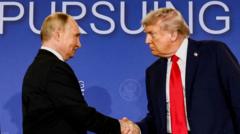Former President Donald Trump’s diplomatic record presents a notable contrast between perceived successes in the Middle East and persistent challenges regarding the conflict in Ukraine. During his administration, initiatives aimed at fostering regional stability, such as the Abraham Accords, demonstrated an approach that yielded normalization agreements between Israel and several Arab nations. These efforts, which some observers characterized as breakthroughs in reshaping Middle Eastern dynamics, focused on bilateral relationships and economic incentives, often bypassing traditional peace frameworks. The nature of these agreements involved distinct regional actors with varying strategic interests, where U.S. influence could be leveraged in specific ways.
In stark contrast, attempts to mediate an end to the ongoing war between Russia and Ukraine have proven significantly more complex. The conflict is characterized by deeply entrenched territorial disputes, fundamental issues of national sovereignty, and Russia’s expansive geopolitical ambitions. Moscow’s motivations and strategic objectives in Ukraine differ fundamentally from the dynamics observed in the Middle East normalization talks. The scale and intensity of the European conflict involve a major global power directly engaged in a full-scale invasion, presenting a much higher bar for mediation.
Efforts to bring the two sides to a negotiating table, or even to establish the preconditions for meaningful dialogue, have repeatedly faced insurmountable obstacles. The recent cancellation or inability to secure a summit between key leaders underscores the profound chasm that exists. Unlike the Middle Eastern initiatives, where economic and security assurances could be traded, the Ukraine war involves existential stakes for Kyiv and is viewed by Russia as central to its security doctrine. The international community’s widespread condemnation, sanctions, and military aid to Ukraine further complicate any potential mediation, limiting the perceived neutrality and leverage of any external arbiter. Consequently, the geopolitical landscape surrounding Ukraine presents an entirely different set of challenges, rendering past diplomatic methods less effective in this unique, high-stakes European conflict.



